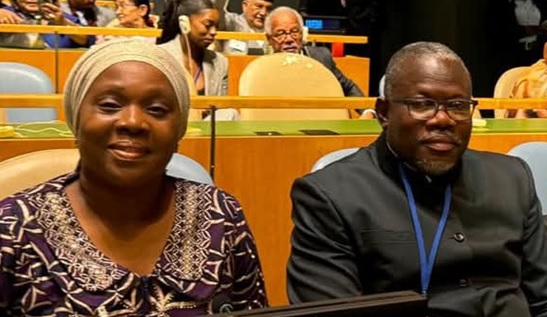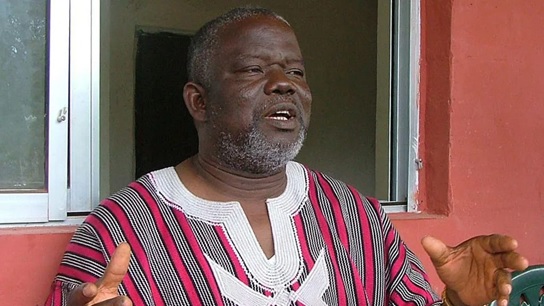MONROVIA, LIBERIA – On Tuesday, November 26, 2024, Matthew Nyanplu, former Assistant Minister for Information Services at the Ministry of Information Cultural Affairs and Tourism (MICAT) broke his silence during a live appearance on OK Conversation hosted by Julius Jeh on OK FM. Nyanplu detailed events leading to his suspension by President Joseph Boakai over the now-infamous Nekotech $25 million scholarship scam. Following the suspension, he tendered his resignation. In his revealing account, Nyanplu narrated a series of contradictions, misrepresentations, and administrative lapses that culminated in the fraudulent scholarship announcement.
The controversy began at a press conference on November 5, 2024, where the Minister of Foreign Affairs Sara Beysolow Nyanti made an unexpected and sensational announcement. According to Nyanplu, the Foreign Minister proclaimed that the Liberian government had secured a $25 million loan for a work-study program in the United States. The program allegedly aimed to fund master’s degrees for Liberian students in Science, Technology, Engineering, and Mathematics (STEM) fields. Nyanplu admitted that he, like many others, initially took the announcement at face value, given the prestige of the Foreign Minister and the significance of the claim.
However, cracks began to emerge almost immediately. Nyanplu explained that the Foreign Minister’s announcement lacked crucial details about the funding’s source and the logistical framework of the scholarship. Suspicions were further raised when Nyanplu’s administrative assistant attempted to apply for the program and encountered unexpected payment demands. Applicants were required to pay $236 to proceed, a demand that sparked internal concerns about the program’s legitimacy.
Digging deeper, Nyanplu discovered inconsistencies between the Foreign Minister’s announcement and information provided by Nekotech, the organization allegedly managing the scholarship program. A colleague attended a webinar hosted by Nekotech and reported that there was no mention of the Liberian government securing the $25 million loan. Instead, the webinar introduced a vague scholarship voucher and readiness school concept, requiring Liberians to pay additional fees for enrollment.
Faced with mounting discrepancies, Nyanplu conducted his own research. He reviewed the webinar recordings and cross-referenced information with official U.S. government resources on work-study programs. His findings revealed that Nekotech’s claims about facilitating work-study opportunities in the United States were not aligned with standard U.S. policies. Furthermore, Nekotech’s representative claimed the initiative was recommended by a Ghanaian pastor connected to Foreign Minister Sara Beysolow Nyanti, raising further doubts about the program’s credibility.
As the situation unfolded, Nyanplu briefed his superiors, including Information Minister Jerolinmek Matthew Piah. He provided a detailed analysis, highlighting the contradictions between the Foreign Minister’s announcement and Nekotech’s actual offerings. Despite the evidence, Nyanplu alleged that his concerns were largely dismissed, with the Information Minister showing reluctance to challenge the Foreign Minister publicly.
The issue escalated when the U.S. Embassy in Monrovia distanced itself from Nekotech, stating they had no affiliation with the organization and no knowledge of the $25 million scholarship program. This revelation undermined the Foreign Minister’s earlier claim that the U.S. Embassy would assist Liberian students with visa applications under the program.
On November 14, during a press briefing, the government attempted to downplay the controversy. The Information Minister vaguely acknowledged public concerns and stated that Nekotech officials would clarify the program’s details during a town hall meeting. However, Nyanplu argued that the use of the term “work-study” by Nekotech was itself deceptive, as no private entity outside the U.S. government could guarantee such opportunities for international students.
Nyanplu’s revelations painted a picture of administrative negligence and misrepresentation. He accused Foreign Minister Sara Beysolow Nyanti of rushing to make a high-profile announcement without proper verification or consultation. He also criticized the lack of oversight within the government, which allowed an unvetted entity like Nekotech to mislead the public.
The scandal has left many Liberians disillusioned, particularly aspiring students who had hoped to benefit from the promised scholarships. Nyanplu argued that the incident reflects a broader issue of poor governance and accountability within the administration. He called for a thorough investigation into the affair and urged the government to issue a formal apology to the Liberian people.
As the story continues to unfold, the Nekotech scandal has become a symbol of the challenges facing Liberia’s education sector. The incident raises critical questions about the government’s commitment to transparency and its capacity to manage international partnerships responsibly. For many, the scandal is not just about a failed scholarship program but a broader failure of leadership and governance.
Nyanplu concluded his interview with a call for reform, highlighting the urgent need for stricter vetting processes in government-backed initiatives. He warned that without greater accountability and transparency, public trust in Liberia’s institutions could face further erosion.
Meanwhile, reports indicate that the government has halted its $25 million Nekotech scholarship program for STEM students amid allegations of fraud and public doubts about its legitimacy. However, Madam Saywhar Nana Gbaa, Assistant Minister for Public Affairs at the Ministry of Foreign Affairs, clarified on OK FM on Wednesday that the program has not been halted. She explained that only new applications have been paused. “We are reviewing the influx of applications to ensure proper evaluation,” Gbaa stated, emphasizing that the program itself remains operational.






